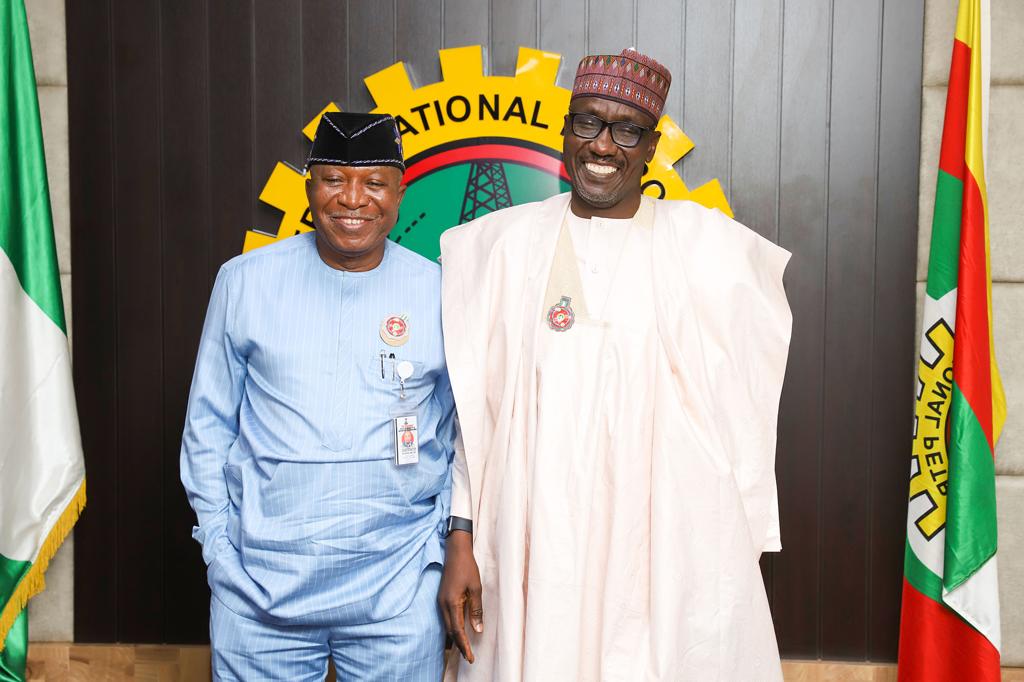
Interim Administrator, Presidential Amnesty Programme (PAP), Col. Milland Dixon Dikio with Group Executive Director, Downstream, Nigerian National Petroleum Corporation (NNPC) during a courtesy visit by the PAP Boss to NNPC Management in Abuja recently
PAP partners NNPC to sustain peace in Niger Delta
The Presidential Amnesty Programme (PAP) and the Nigerian National Petroleum Corporation (NNPC) have agreed to work together to tackle pipeline insecurity, unemployment and other challenges in the Niger Delta region.
The agreement was reached when PAP’s Interim Administrator, Col. Milland Dixon Dikio (rtd) led a delegation to visit the Group Managing Director, NNPC, Mr Mele Kyari
Dikio according to a statement signed at the weekend by his Special Adviser Media, Neotaobase Egbe, said the meeting was strategic and in line with the objective of PAP to partner with all relevant stakeholders for the full implementation of the amnesty programme.
He said PAP was courting willing partners to have a robust synergy to drive the Niger Delta Recovery Plan (NDRP) to fruition.
He noted that though PAP was executing its own role in reintegrating 30,000 ex-agitators captured by the Presidency, there was a need to strengthen partnership between sister agencies of the government for the sustainable development of the Niger Delta.
He said the NNPC like other institutions of government had roles to play in oil assets redistribution, infrastructural development and environmental remediation.
Dikio said that there was a need to control disruptions in oil production, saying destructive energies could be channelled into productive ventures through re-orientation and sustained advocacy.
He also said that PAP had made efforts to cut down irrelevant trainings and had become intentional about successfully empowering its delegates.
He said trainings over the years had become contractor-driven and were not meeting the beneficiaries’ needs.
Dikio maintained that the PAP was targeting functional businesses that had the capacity to train, employ and mentor delegates into becoming successful business owners.
He said: “For instance, if we have someone that has a commercial poultry farm and we partner with them to train our delegates, they will be employed after their training. In the course of 2 years and 5 months they will be taken through the ropes of poultry farming before they are sent out to start their own poultry.
“It is a win-win for everybody. We did the research and we discovered that the cassava plant in Bayelsa needs about 20,000 metric tons of cassava daily, so there is ample opportunity for our delegates to go into that kind of business.
“Again, palm oil when sold in international markets is above $1000 a ton and here, we are in the region only focusing on oil and gas”.
Dikio further said there were arrays of businesses the PAP was looking to inject delegates into, adding that exceptional graduates under the PAP scholarship scheme had more opportunities for employment.
In his remarks, the NNPC GMD, Mele Kyari, commended Dikio for the efforts to ensure peace in the Niger Delta and emphasized the need to sustain the peace through accommodation and inclusiveness of Niger Delta youths.
He bemoaned the inability of the oil industry to fulfil its obligations to the region over the years, saying that it was one of the reasons the amnesty programme had prolonged.
He said: “As we speak today, we have seen a number of increasing incidents of unrest; cases that remind us of the past we don’t want to recollect again.
“Therefore, everything you have said points to the fact that inclusion, support and empowerment for young people particularly in the Niger-Delta will bring peace and development to the Niger-Delta. No amount of resources available to you will give you peace except there is alignment with the respective players in the space”.
Kyari said the award of licences to investors to begin production on about 57 marginal oil fields within Niger Delta in 2022 was designed to support businesses that originated from the region because most of the beneficiaries from the marginal field programme were indigenes of the Niger Delta.
He said working together would bring lasting peace to the region explaining that the number of experienced technical people produced from the programme, would easily fill employment opportunities.
He said: “Once you create opportunities and investments return, more employment opportunities will come. I think it is a good thing that we work together, both the amnesty programme and all other actors in this space to bring the lasting peace to the Niger Delta and across our country, where people can benefit because ultimately if we cannot give, there will be nothing to show in another five to ten years, that is the reality that we are in.â€

